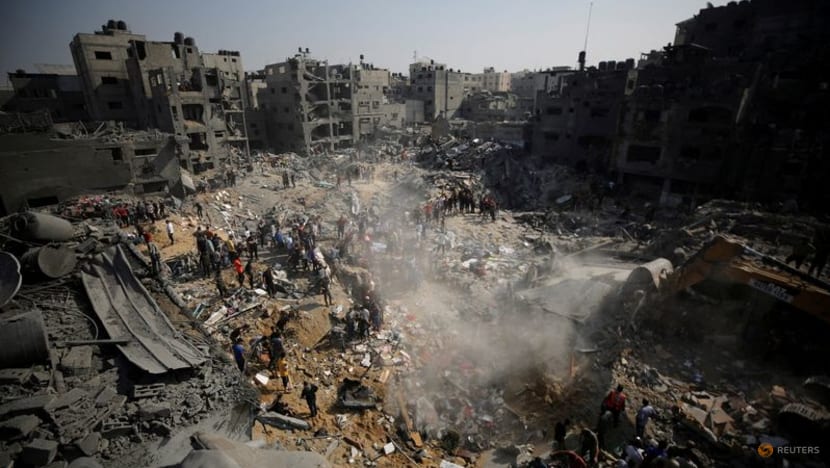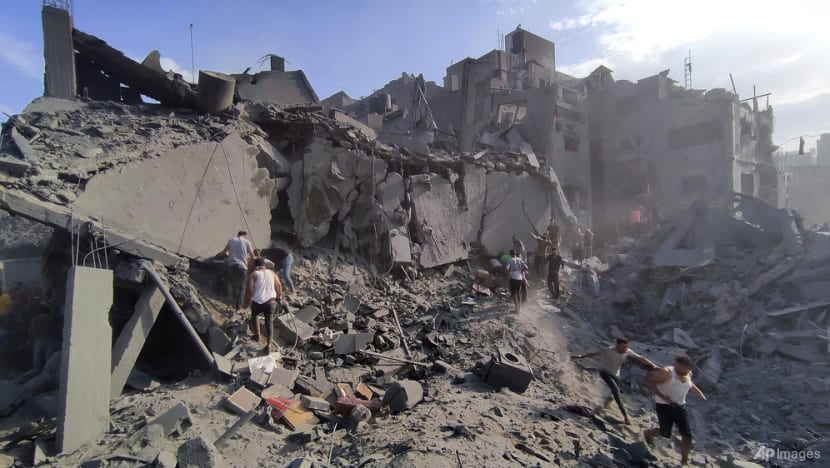Israeli strikes on Gaza refugee camp could be war crimes: UN

Palestinians search for casualties a day after Israeli strikes on houses in Jabalia refugee camp in the northern Gaza Strip on Nov 1, 2023. (Photo: Reuters/Mohammed Al-Masri)

This audio is generated by an AI tool.
GENEVA: Israel hit Gaza's largest refugee camp with renewed air strikes on Wednesday (Nov 1), prompting UN rights officials to warn that targeting densely populated residential areas "could amount to war crimes."
Israeli strikes have targeted the Jabalia refugee camp twice in two days, killing and wounding dozens, according to the health ministry in the Hamas-run Palestinian territory.
Gaza's Hamas-run government media office said on Thursday that at least 195 Palestinians died in Israel's attacks on the refugee camp, with 120 still missing under the rubble. At least 777 more were wounded, it added.
AFP witnessed extensive damage at the scene, with people frantically clawing through rubble to extract bloodied casualties.
"It is a massacre," said one witness of the strike.
The Israeli military said its fighter jets struck a Hamas command and control complex in Jabalia "based on precise intelligence", killing the head of the Islamist group's anti-tank missile unit, Muhammad A'sar.
"Hamas deliberately builds its terror infrastructure under, around and within civilian buildings, intentionally endangering Gazan civilians," an Israeli statement said.
Israel said Tuesday's raid was a successful hit on top Hamas commander Ibrahim Biari.
"Given the high number of civilian casualties & the scale of destruction following Israeli air strikes on Jabalia refugee camp, we have serious concerns that these are disproportionate attacks that could amount to war crimes," the office wrote on X, formerly Twitter.
Israel said its fighter jets had carried out the strike, targeting "a Hamas command and control complex" and "eliminating" an undefined number of militants.
Rescuers said "whole families" had died, but casualty details could not be immediately confirmed.
Israel has relentlessly pounded Gaza in retribution for the worst attack in the country's history.
Hamas gunmen stormed across the border from Gaza on Oct 7, killing 1,400 people, mostly civilians, and taking more than 230 hostages, according to Israeli officials.
Israel's retaliatory bombing campaign has killed 8,796 people, mainly women and children, according to Hamas-run Gaza's health ministry.
Many nations backed Israel's right to strike back at Hamas, but as the civilian toll has mounted, so too has criticism of Israeli tactics.
The principle of proportionality referred to by the UN plays a central role in the wars of law defined by the Geneva Conventions.

Related:
Civilians and civilian structures must be spared - but the death of civilians during a conflict does not necessarily constitute a war crime.
Warring parties can launch attacks deemed proportionate on military targets even while knowing that civilians could also be hit.
A crime is committed when an attack is deliberately carried out against civilians, or if the scale of the damage to civilians is excessive compared to the military advantage.
The International Criminal Court is the only independent international legal authority that carries out investigations into genocide, war crimes and crimes against humanity, but Israel is not a member.
"WAR CRIMES"
The United Nations decried Israel's most recent bombings, joining a chorus of international condemnation from as far afield as Bolivia, which severed diplomatic ties in protest.
The UN's top human rights body - citing "the high number of civilian casualties" and scale of destruction - said it had "serious concerns that these are disproportionate attacks that could amount to war crimes".
Jordan recalled its ambassador to Israel "to condemn the Israeli war that is killing innocent people in Gaza".
Israel has rejected such accusations, saying Hamas deliberately uses civilian areas to hide command posts and arsenals that are used to attack Israeli civilians.
The Israel Defense Forces said Tuesday's strike on Jabalia had killed Hamas battalion commander Ibrahim Biari and destroyed an underground tunnel complex.
Lieutenant Colonel Richard Hecht described Bihari as a "high-value target" who deployed Hamas commandos during the Oct 7 attacks and has since "overseen Hamas' battle efforts in northern Gaza".
"Our war is not with the people of Gaza," he said. "The Palestinian people deserve peace and safety. Instead they are exploited as shields."
Hamas said seven of the 240 hostages it is holding, including three foreign passport holders, died in Tuesday's bombing, a claim that was impossible to verify.
The group's leader Ismail Haniyeh accused Israel of committing "barbaric massacres against unarmed civilians", saying it was covering its own "defeats".
Visiting professor at the International Affairs Program at the University of Colorado Boulder Zach Levey said it is “unclear at the moment” if the deadly attacks would be considered war crimes.
"The Israelis are presenting a military exigency for the action. And they will also say that it was not intentional – in other words, they have not targeted civilians ... I believe that the point is unclear at the moment," he told CNA's Asia First on Thursday.
"FINALLY"
Earlier on Wednesday, hundreds of foreign passport holders, and wounded and sick Palestinians, were allowed to escape the fighting into Egypt, the first such evacuations since the war began.
After weeks of waiting, of hoping, the gates at Rafah opened and whole families - struggling under the weight of their few remaining worldly possessions - rushed across the heavily fortified frontier.
Ambulances whisked the wounded to the safety of Egyptian field hospitals, including one young boy with heavy bandaging around his stomach.
Egypt said in all 335 foreigners or dual nationals and 76 of the seriously wounded and sick had crossed.
"We have been heading to the crossing for 25 days," said Alaa al-Shubaki, a Jordanian citizen. "Finally, I found my name in the evacuees list".
The foreigners included 31 Austrians, 20 Australians, five French nationals, four Italians, and some German and US citizens, their governments said.
Umm Saleh Hussein, a Jordanian, said water and electricity shortages were "the least" of the hardships in Gaza.
"There were bigger problems such as the bombardment. We were afraid. Many families were martyred," she told AFP.
For those left behind, the wait for safety goes on.
"There is no hope in the Gaza Strip. It is not safe any more here," said Amen al-Aqluk, who fled Gaza City under Israeli orders.
"When the border opens, everybody will leave and emigrate. We encounter death every day, 24 hours a day."
A Gaza official said about 50 trucks carrying medical and food aid entered Gaza on Wednesday, among the biggest daily flows so far.
About 1,000 Palestinian children from Gaza were being offered treatment at hospitals in the UAE, accompanied by their families, the UAE state-run news agency WAM said.
Gaza border officials said the frontier would reopen on Thursday so more foreign passport holders could exit. A diplomatic source briefed on Egyptian plans said about 7,500 foreign passport holders would be evacuated from Gaza over about two weeks.
But the situation in Gaza remains desperate, with food, fuel and medicine for the 2.4 million residents all running short, according to aid groups.
More than 20,000 wounded people are still trapped in the Gaza Strip, according to Doctors Without Borders (MSF).
"Those who wish to leave Gaza must be allowed to do so without further delay. They must also be allowed the right to return," MSF said in a statement calling for a greater number of people to be evacuated.
"NO REST"
With fears mounting of a regional war, US President Joe Biden called for "urgent mechanisms" to dial down tensions and said top diplomat Antony Blinken would embark on another Middle East tour from Friday.
Turkey and Iran called for a regional conference to prevent a conflagration, as Israel faces a daily barrage of aerial attacks from Hamas and other Iran-backed groups around the Middle East, including Yemen's Huthi rebels.
In the north, Israel has traded near-daily fire with Lebanon's Iran-backed Hezbollah.
And the families of hostages kidnapped by Hamas have endured an unbearable wait for news of relatives thought to be held in the labyrinth of tunnels deep below Gaza.
Ayelet Sella, whose seven cousins were kidnapped by Hamas, said she could find "no rest" until her loved ones are returned.
"We have no more tears, our eyes are dry, we are empty three weeks on," Sella told AFP at the Great Synagogue in Paris. "I only ask for one thing, that they come back."














